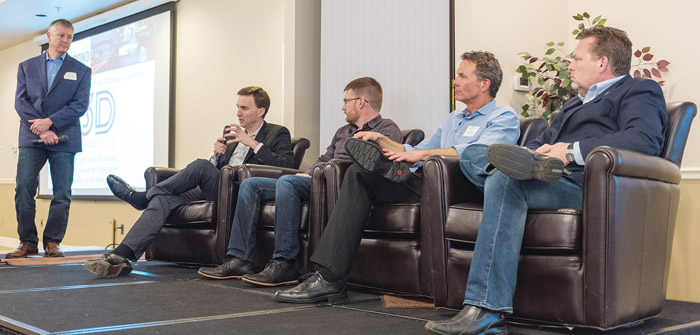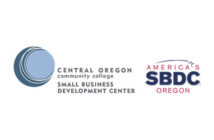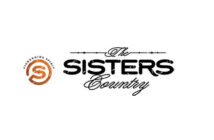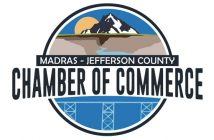(Photo above: (L-R) Moderator Mike Garrett, Paul Benning of HP, Mark Silliman of Tend.ai, Dr. Blake Nonweiler of The Center and Mark Christiansen of Concept Designs | Photo by Timothy Park)
Three entrepreneurs and a physician touted a rising technology wave of 3D printing and robotics Wednesday, May 17, during Redmond Economic Development Inc.’s (REDI) annual luncheon at Eagle Crest Resort.
Paul Benning, chief technologist for 3D printing with computer giant HP, called the current strides in 3D printing “the tipping point of the fourth industrial revolution.” He noted his company recently launched a 3D unit, which Benning said “shows how serious HP is about this area.”
3D printing is a $6 billion industry now and Benning anticipates growth to $18 billion by 2021. Multi-jet fusion technology allows printing that is 10 times faster than before at half the cost, according to Benning.
“We launched with five partners and there are now 50 working with us in Corvallis on these multi-jet fusion printers,” he said.
A three-member panel discussed their experiences with robotics. They included Mark Silliman, co-founder of Tend.ai; Dr. Blake Nonweiler of The Center for Orthopedic and Neurosurgical Care and Research; and Mark Christiansen of Concept Designs.
Tend’s smart cloud robotics allows a company to monitor and control its robots without downloading any software. Silliman said the price of robots is “plummeting” with models that cost $100,000 a few years ago now available for $20,000. That could drop to $5,000 in a few years, he added.
Silliman said robots are already common in Japan hospitals, where the devices move supplies from place to place.
“The Jetsons is already here,” Christiansen acknowledged. “Whatever we can think of can happen.”
He suggested that colleges and technology firms have a dialogue about industry needs in order to produce better-equipped graduates. Finding potential employees with the right skill set isn’t always easy, he said.
“We train everyone who comes on board because every scanner is different,” Christiansen said.
Robotic-assisted technology is improving results for patients who undergo knee replacement operations or other surgical procedures, according to Nonweiler. He specializes in arthroscopic sports medicine, cartilage restoration, and minimally invasive arthroplasty surgery of the knee and shoulder.
Studies of patients who have had surgery with Makoplasty robotic technology show those patients had improved and more accurate alignment in hip and knee replacements.
During an interview with CBN, Nonweiler described the results of partial knee replacement in a woman whose backpacking outings were hindered by knee pain. Just weeks after robotic-aided surgery, she and her husband did 45 miles of hiking — without pain — at Zion National Park in Utah.
The Mako robotic arm improves surgical outcomes by providing more accurate placement and alignment of implants to improve joints.
“Our biggest threat is cost,” Nonweiler said. “How do we buy a million-dollar machine and justify it so hospitals will buy more of these things.”
Prior to the panel discussion, Economic Development of Central Oregon (EDCO) executive director Roger Lee noted there was “great success” attracting new businesses to Redmond last year. He mentioned BasX Solutions and PCC Schlosser as two of the area’s fastest-growing firms.
He added that the Redmond Municipal Airport is another bright spot. There was double-digit growth last year in passengers and the number of flights out of Redmond, Lee said.
Spending on robotics systems worldwide is expected to grow 17 percent a year, reaching an estimated $135 billion by 2019, according to figures from REDI. About 65 percent of current robotic spending is in the Asia-Pacific region, the agency said.
About three-fourths of the 752 robotics start-up companies focus on new areas. Those include unmanned devices (25 percent), agriculture (6 percent), mobile platforms (7 percent), health care (7 percent), consumer products (9 percent), and the educational and hobby markets (5 percent).
Deschutes County’s business climate boasts an annual average wage of $19.57 per hour or $40,704 annually, according to other REDI figures. Several motor freight companies have daily service to Portland, and there is rail freight service.
REDI points out there are more than 1,200 acres of developable land in Redmond, with industrial land prices ranging from $2.50 to $7.85 per square foot.
During his brief address, EDCO’s Lee said that umbrella agency of which REDI is a part has helped 130 companies with business services, resources and tools. Six business development projects, including expansion, recruitment and start-ups, also have benefited from local economic development efforts.
“We want to make this an easy place to do business,” Lee said.





